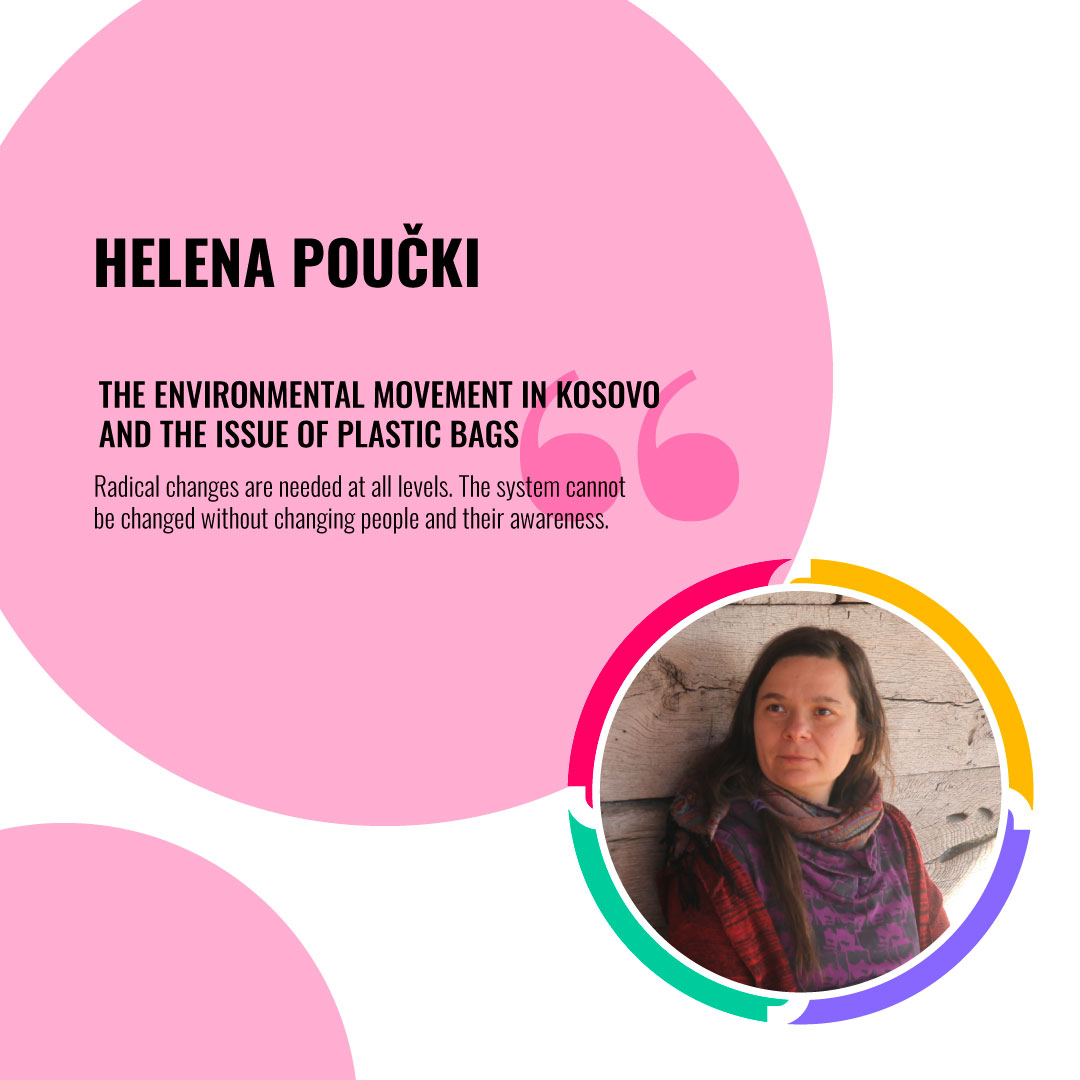Category: Blog Tags: #ENVIRONMENT
Plastic bags, of course, are not good. They should be banned as in Tanzania, where it is not even allowed to bring them when traveling. However, the problem is not just about them. The problem lies in our values, principles, and worldview. One could say it's also systemic.
Instant culture, short-term goals, superficial solutions, inconsistent actions, and a distorted attitude towards nature and many living beings together lead to complex eco-social problems, to which civil society still lacks an adequate response.
In Kosovo, environmental issues are somewhat sporadic and mostly present thanks to donors. The European Union pushes its agenda, the US supports the development of renewable energy sources, Switzerland supports integrated water management development, and everyone has their own agenda, etc.
Civil society organizations respond to donor calls with their ideas, and priorities and topics change in cycles. And so now we have a surge of projects on the circular economy, energy transition, and of course, projects on climate change.
There seems to be no environmental network or movement in Kosovo yet. Occasionally, organizations come together through projects or by signing joint statements, but sincere and selfless collaboration for the preservation of nature, environmental improvement, and a healthier future is lacking. Not even the fight against small hydropower plants has persisted or united organizations and local initiatives. The small hydropower story has worn thin, local activists have lost trust and hope in justice coming, institutions have proven their incompetence, and organizations their inability to truly cooperate.
Meanwhile, rivers and streams have become channels for wastewater. The most beautiful streams on Šar/Sharr mountain have been piped. National parks have been understaffed for years, and managing a national park requires a large team, expertise, transparency, financial support, and dedication. Massive buildings are being constructed where no one lives. Huge amounts of resources and energy are invested in apartments that may be used only one month a year. Thousands of cottages in Brezovica/Brezovicë and Novo Brdo/Novobërdë go without saying.
Every June 5, which is World Environment Day, trees are planted. Most do not survive, but it seems irrelevant. River, park, lake, and settlement cleanup actions have been organized for years, and every spring, before vegetation blossoms, Kosovo doesn't look good. The problem of thermal power plants and air pollution, especially in urban areas, has been talked about for decades, but it's harder to breathe every winter.
Something is wrong there.
Last year was the warmest since anthropogenic climate change began. This year will likely be even warmer, but it doesn't matter. Climate devices work at full steam, doors are kept open for a little (polluted) air and draft. Often, it happens that the very institutions that promote green agendas and reduce greenhouse gas emissions are examples of bad practice. Sometimes it seems that environmental problems are actually an inexhaustible resource for strategies, plans, and projects, actions, and campaigns...
But, nevertheless, this cannot go on forever.
Sometimes in this instant world, it's necessary and useful to stop and rethink. To reconsider individually, then in the family, neighborhood, organization, company, or institution. They say it's easiest to explain and instill ecological values in children and that there's no point in working on these issues with older people, as if adults can't think for themselves. Adults underestimate themselves, and maybe it's just an excuse not to change too much and give up daily comfort of consumption.
Radical changes are needed at all levels. The system cannot be changed without changing people and their awareness. Projects and strategies are futile if we continue to consume and waste everything, even life itself.
Solutions to environmental problems exist. There's no need to reinvent the wheel. Hypothetically, most environmental issues in Kosovo can be resolved, a value system with an ecocentric approach (from the Greek word oikos - home, household) can be built, and protected areas can even be expanded. It requires courage, sobriety, and unity.
Strategic and political decisions must be made in favor of nature, the environment, and future generations. Environmental organizations should unite, rid themselves of anthropocentric attitudes, competitive approaches, and divisions based on nationality or ethnicity. We should and should be an example of what we advocate and stand for. Perhaps it's become a tired phrase that the environment and climate extremes know no boundaries, nationalities, or religions... Rich countries may adapt more easily to extreme conditions in certain situations, but maybe we poorer ones will fare better because there are still people who grow their own food (for themselves and others), protect forests, save energy and water, nurture neighborly relationships, and don't value everything in terms of money.
Our daily relationship with the environment affects the conditions in which we will live. It all adds up to a collective balance. It certainly matters how much water we use, what detergent we use, whether we throw organic waste with everything else, whether we heat too much, or spend more electricity than necessary. It also matters what food we buy, where it comes from, how far it traveled, how it was treated, how much plastic it's packaged in, and who produced it. It matters how much meat and dairy products we use in our diet and where they come from. The dairy and meat industry are among the largest contributors to greenhouse gas emissions (about 15%), and any dietary change significantly affects individual ecological footprint.
Ultimately, instead of short-term plans and superficial solutions, we could look to the Iroquois tribe and their principle of seven generations. Each of their decisions is made to leave better conditions for at least the next seven generations. We may not have to go seven, but if we were to think about at least the next three generations, much of today would look, smell, radiate, and flow differently.
And yet, don't take a plastic bag in the store (even though it was announced that they would be paid for, in most stores everything is still packed in them for free). Daily small actions and reactions are a reflection of our principles and beliefs, so accepting or not accepting a plastic bag has its significance, besides the fact that the bag will wait for several future generations. The plastic bag is a symbol of the future you believe in and hope for yourself and future generations. The more of us understand the problem the plastic bag represents and begin to carry our bags, the easier it will be to connect and recognize each other at a value level and unite in the fight for a healthier and more normal future for those who come after us. Very difficult, warm, dry, full of extremes and unpredictable years lie ahead of us.
May Earth and Heaven help us...




